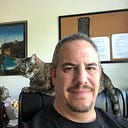Member-only story
Why Did You Choose the Villain that You Did?
What message does your choice send to the reader?
I just finished a military sci-fi book, the first in a series. The story had a great protagonist, an excellent example of Campbell’s “Hero’s Journey”. The action, the adventure, the other characters, and the world the author created were intriguing. It was great hard sci-fi, and it was hard to put down.
But as the conflict shifted from the protagonist proving himself to learning who the real villain was — and needing to fight them — I became uncomfortable. This was because their villain was a Muslim Caliphate in space.
It was every ugly, unpleasant, nasty trope about Muslims you can imagine. Slave-trading, turning women into naught but living sex dolls, the fierce zealotry of the warriors, and more. They were painted as a nation of horrid, distressing, inhuman aggressors. All of them.
This made me deeply uncomfortable. Why? Because I consider using this sort of stereotype of a real-world group dangerous. It does a disservice to the believers who are not in league with the over-zealous and terrorist members of their religion.
This would strike me the same if blacks, Christians, or a similar group were the villain. Making a people or a religion the bad guy dehumanizes them.
